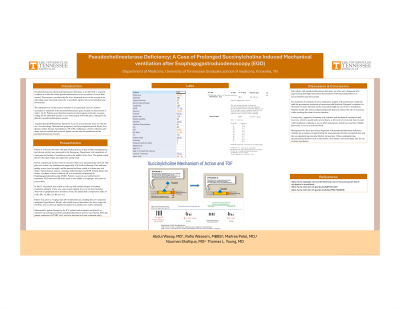Sunday Poster Session
Category: General Endoscopy
P0713 - Pseudocholinesterase Deficiency: A Case of Prolonged Succinylcholine-Induced Mechanical Ventilation After Esophagogastroduodenoscopy (EGD)
Sunday, October 27, 2024
3:30 PM - 7:00 PM ET
Location: Exhibit Hall E

Has Audio
- AW
Abdul Wasay, MD
University of Tennessee Medical Center
Knoxville, TN
Presenting Author(s)
Abdul Wasay, MD1, Rafia Waseem, MBBS2, Maitree Patel, MD, MBA3, Nouman Shafique, MD4, Roderick S. Brown, DO5
1University of Tennessee Medical Center, Knoxville, TN; 2Shalamar Institute of Health Sciences, Lahore, Punjab, Pakistan; 3Palmetto General Hospital, Hialeah, FL; 4AdventHealth Medical Group, AdventHealth, Orlando, FL; 5Hattiesburg GI Associates, Hattiesburg, MS
Introduction: This is a case of plasma pseudocholinesterase deficiency in a patient who was unable to extubate and had a prolonged mechanical ventilation after receiving succinylcholine for EGD. Pseudocholinesterase deficiency is a rare genetic as well as an acquired disorder that affects the body's ability to metabolize choline esters such as succinylcholine and mivacurium. In most cases of pseudocholinesterase deficiency, no signs or symptoms of the condition exist. It is first suspected after a prolonged recovery from paralysis following general anesthesia in which succinylcholine or mivacurium are administered.
Case Description/Methods: 66-year-old male presented to the emergency department (ED) with complaints of chest pain and feeling of something stuck in the middle of his chest. The patient started to experience chest pain last night after eating a steak. Pain had been worsening since last night, and the patient had been unable to tolerate any oral intake.
Subsequently, patient was taken for an EGD to rule out esophageal stricture, mass or food bolus impaction. Patient was given succinylcholine for anesthesia during the EGD. In PACU, the patient was unable to wake up and extubate despite of multiple extubation attempts and no facial twitches were observed on peripheral nerve stimulator. Subsequently, patient brought to the ICU sedated and intubated, placed on minimal vent settings and serum pseudocholinesterase assay was sent. The next day, patient underwent SAT/SBT trial, which he tolerated well and extubated safely. However, pseudocholinesterase assay after a few days returned an abnormally low value of 360 L (typical 3342-7586 IU/L).
Discussion: Pseudocholinesterase deficiency can lead to a prolonged effect of the neuromuscular blocking agents such as succinylcholine and mivacurium. Physicians need to be aware of this condition due to risk of prolonged paralysis causing prolonged mechanical ventilation. However, neuromuscular monitoring ensures patient safety and non-depolarizing neuromuscular blockers such as atracurium, rocuronium, and vecuronium are safe for use in future anesthehtics.
Disclosures:
Abdul Wasay, MD1, Rafia Waseem, MBBS2, Maitree Patel, MD, MBA3, Nouman Shafique, MD4, Roderick S. Brown, DO5. P0713 - Pseudocholinesterase Deficiency: A Case of Prolonged Succinylcholine-Induced Mechanical Ventilation After Esophagogastroduodenoscopy (EGD), ACG 2024 Annual Scientific Meeting Abstracts. Philadelphia, PA: American College of Gastroenterology.
1University of Tennessee Medical Center, Knoxville, TN; 2Shalamar Institute of Health Sciences, Lahore, Punjab, Pakistan; 3Palmetto General Hospital, Hialeah, FL; 4AdventHealth Medical Group, AdventHealth, Orlando, FL; 5Hattiesburg GI Associates, Hattiesburg, MS
Introduction: This is a case of plasma pseudocholinesterase deficiency in a patient who was unable to extubate and had a prolonged mechanical ventilation after receiving succinylcholine for EGD. Pseudocholinesterase deficiency is a rare genetic as well as an acquired disorder that affects the body's ability to metabolize choline esters such as succinylcholine and mivacurium. In most cases of pseudocholinesterase deficiency, no signs or symptoms of the condition exist. It is first suspected after a prolonged recovery from paralysis following general anesthesia in which succinylcholine or mivacurium are administered.
Case Description/Methods: 66-year-old male presented to the emergency department (ED) with complaints of chest pain and feeling of something stuck in the middle of his chest. The patient started to experience chest pain last night after eating a steak. Pain had been worsening since last night, and the patient had been unable to tolerate any oral intake.
Subsequently, patient was taken for an EGD to rule out esophageal stricture, mass or food bolus impaction. Patient was given succinylcholine for anesthesia during the EGD. In PACU, the patient was unable to wake up and extubate despite of multiple extubation attempts and no facial twitches were observed on peripheral nerve stimulator. Subsequently, patient brought to the ICU sedated and intubated, placed on minimal vent settings and serum pseudocholinesterase assay was sent. The next day, patient underwent SAT/SBT trial, which he tolerated well and extubated safely. However, pseudocholinesterase assay after a few days returned an abnormally low value of 360 L (typical 3342-7586 IU/L).
Discussion: Pseudocholinesterase deficiency can lead to a prolonged effect of the neuromuscular blocking agents such as succinylcholine and mivacurium. Physicians need to be aware of this condition due to risk of prolonged paralysis causing prolonged mechanical ventilation. However, neuromuscular monitoring ensures patient safety and non-depolarizing neuromuscular blockers such as atracurium, rocuronium, and vecuronium are safe for use in future anesthehtics.
Disclosures:
Abdul Wasay indicated no relevant financial relationships.
Rafia Waseem indicated no relevant financial relationships.
Maitree Patel indicated no relevant financial relationships.
Nouman Shafique indicated no relevant financial relationships.
Roderick Brown indicated no relevant financial relationships.
Abdul Wasay, MD1, Rafia Waseem, MBBS2, Maitree Patel, MD, MBA3, Nouman Shafique, MD4, Roderick S. Brown, DO5. P0713 - Pseudocholinesterase Deficiency: A Case of Prolonged Succinylcholine-Induced Mechanical Ventilation After Esophagogastroduodenoscopy (EGD), ACG 2024 Annual Scientific Meeting Abstracts. Philadelphia, PA: American College of Gastroenterology.
